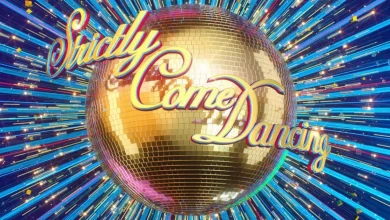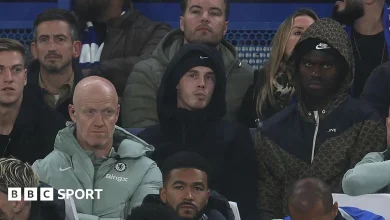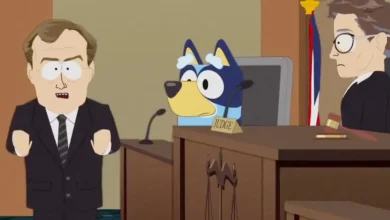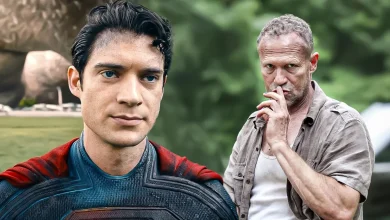The Smiths’ Mike Joyce: ‘I’m not on Morrissey’s Christmas card list’
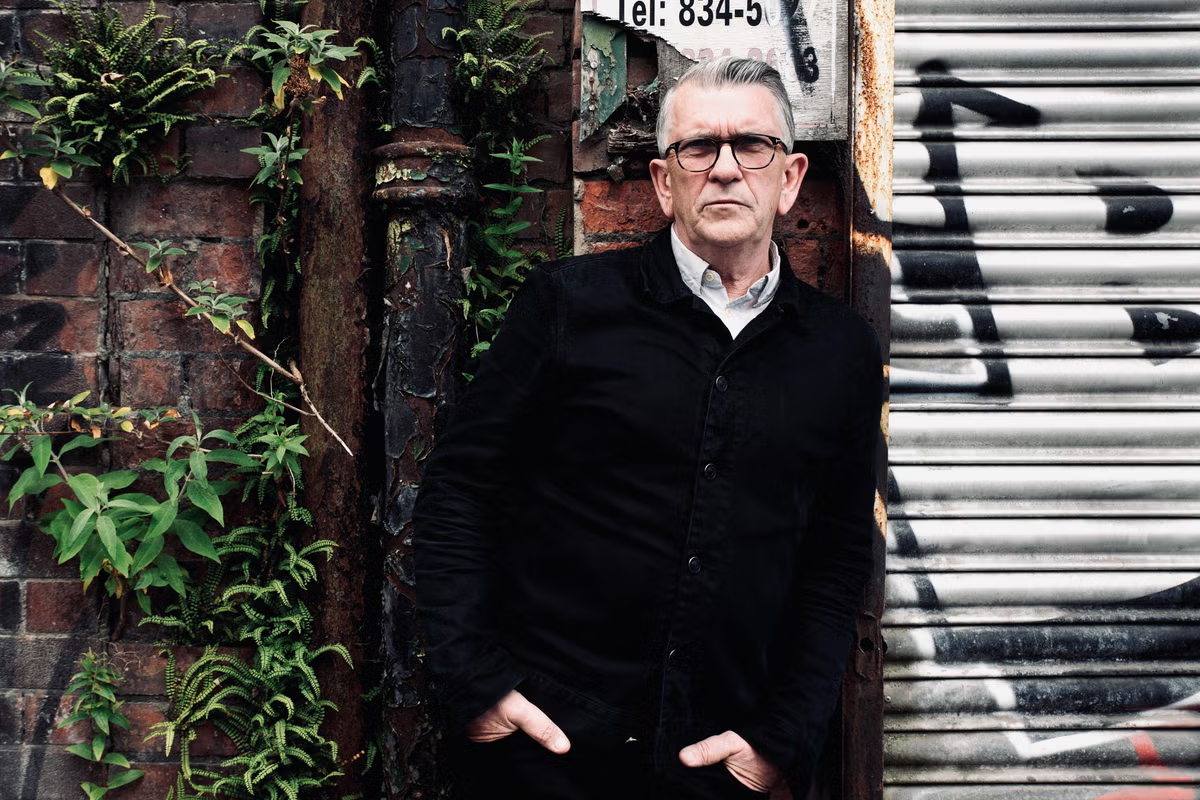
One Thursday in November 1983, just after 7.30pm, an ex-punk sat bathed in pink light at the BBC Television Centre. Just 20 years old, he drummed in a band that had only existed for 10 months: friend-of-a-friend Johnny Marr on guitar, Andy Rourke, Marr’s schoolmate, on bass, and a singer, Morrissey, swinging gladioli round his head like a cowboy with a lasso, crooning about punctured bicycles and jumped-up pantry boys.
“We all clicked straight away,” says Mike Joyce, sitting in a plant-filled room at his house in Sale, Greater Manchester. He’s reminiscing about The Smiths, the band he was in for less than five years but will be forever associated with. Now 62, sporting a stripy sweater, smart specs and a tiny, silver quiff, he’s less cool or eccentric rock’n’roll veteran than a sweet, groovy dad with a Tiggerish energy, hard to interrupt as he chats nine to the dozen about “incredible times”. He recalls The Smiths’ iconic Top of the Pops debut playing “This Charming Man”, after which they leapt on a train to play to a sold-out, 1,500-capacity crowd at Manchester’s Hacienda. “We’d come a long way from Cath Berry [their hairdresser’s sister] clapping alone in February,” he writes in his new memoir, The Drums.
Titled after the way Morrissey listed Joyce on their enigmatic, film-referencing album sleeves, The Drums focuses on the group’s giddy lifespan and not what happened next: a seven-day court battle in which he fought Morrissey and Marr to claim 25 per cent of recording and performance royalties and, as we discover through a footnote on page 192, eventually won. Biographer Jennifer Otter Bickerdike, who encouraged Joyce to write the book, told him he didn’t have to do “a call and answer thing about the court case, which I’d find it a little bit distressing”, and instead suggested something she felt was missing from Morrissey and Marr’s separate memoirs: what it was really like to be a Smith. “I said, I can talk about the experience, the beauty, the intensity, the wonderment, and she said, ‘Well, Mike, there’s your book.’”
We begin with Joyce’s Irish Catholic upbringing as the youngest of five children, the “spoilt baby” of a miner and a mum working three jobs to make ends meet (“I could’ve asked my mum for the moon,” he writes, “and she would have asked me, ‘Which one? Full? Crescent? Half ?’”). Aged nine, Joyce was knocked down by a hit-and-run driver and would have died of internal bleeding, he believes, if he hadn’t woken up briefly to tell the nurse she owed him £50 in Monopoly, and that he had a pain in his stomach (a ruptured spleen, on top of the broken collarbone and 30 stitches in his head). He then survived six months’ recovery in hospital, a phase of fits, corporal punishment at school and the hostile attention of Salford gangs before he fell for punk and, at 15, got his first kit.
He was playing in his second band, Victim, while Marr was running around town, desperate for a drummer. “If I hadn’t woken up in the hospital, I wouldn’t have been having this conversation with you now,” Joyce says. “If I had been born in Cardiff, I wouldn’t have been in the Smiths. I feel as though Lady Luck and me, we kind of travel hand in hand.” His punk edge still gives “The Queen Is Dead” intro and the middle-eight of “Bigmouth Strikes Again” a startling power; he mastered a soft, magical style in ballads such as “I Know It’s Over” and “Last Night I Dreamt That Somebody Loved Me”. Meanwhile, Morrissey’s songwriting was universal, but not your usual boy-loves-girl nonsense, he says. “It’s about being shunned, being ‘woe is me’, being lustful.”
In the book, Morrissey is a distant figure, ignoring Rourke on bus journeys home from rehearsals, or nibbling apples in the cab of their tour van while his bandmates got stoned, ate “s*** food” and DJ’d on cassettes on a mattress in the back. Joyce also played on Morrissey’s early solo singles; they last saw each other after the release of Johnny Rogan’s controversial 1993 book, The Severed Alliance, about Morrissey and Marr. “We just went for a pint in Altrincham – that was it.” Was that the last time? “No – I also saw him again in Altrincham five or 10 years ago, although he didn’t see me.”
open image in gallery
‘I saw Morrissey in Altrincham five or 10 years ago… although he didn’t see me’ (Sal Gig Junkie)
Morrissey’s mother lived in Altrincham, eight miles southwest of Manchester, and he would visit until her death in 2020. Joyce spotted his former bandmate in the most un-rock’n’roll of settings: a computer shop. Morrissey was buying printer ink; Joyce was by the door waiting for help, knowing his old frontman was about to turn around… until a shop assistant approached Joyce, unknowingly nixing the reunion. “It was a kind of revolving door moment.”
What would he have said? “Hi, how are you doing?” Joyce suggests with a grin. He shrugs softly. “I just wanted to speak to him and see what reaction I’d get, but that didn’t happen.” What does he think Morrissey would have said in response? “I don’t think he’d be, ‘Wahey!’” Joyce bursts out laughing. “‘How’re you doing? Long time no see!’ It’s that famous adage, basically. I’m not on his Christmas card list.” It’s hard to imagine many people are. Morrissey has become an increasingly controversial figure: in recent years, he has praised Nigel Farage and George Galloway as “liberal educators”, cast doubt on Harvey Weinstein’s accusers, and accused Marr of ignoring offers to reform The Smiths (Marr confirmed in June that he had received a reunion offer for an “eye-watering amount of money”, but said no).
Morrissey had a huge influence on me as a person, not just as a musician
Joyce mentions recent statements Morrissey made on his website in September, about “wanting to sell his back catalogue because of the vexatious behaviour of myself, Johnny and even Andy for some reason [Rourke died of pancreatic cancer in 2023]. I don’t know why he posted that.” He’s happier remembering the Morrissey he knew, doing incongruous things like chatting backstage at Top of the Pops to Page 3 model and pop singer Samatha Fox about the best hairsprays, and introducing Joyce to the work of Shelagh Delaney and Oscar Wilde through his lyrics (”I didn’t know anything about these people before”). He also convinced Joyce to become a vegetarian, the day the band recorded their 1985 album title track “Meat Is Murder”. “I became vegetarian on that day, and I’ve been vegetarian ever since – my children and my grandchildren are too. So he had a huge influence on me as a person, not just as a musician.”
open image in gallery
The Smiths in 1984, L-R: Andy Rourke, Morrissey, Johnny Marr and Mike Joyce (Paul Cox/Sire Records)
Joyce last saw Marr, meanwhile, at Manchester City’s Etihad Stadium in 2023, when he was interviewed pitch-side with fellow celebrity fan Noel Gallagher. The Oasis rocker brought Marr, a longtime friend, along with him. “I said to Johnny, ‘We’ve got to keep meeting like this.’” A few weeks earlier, they’d seen each other for the first time in years at Rourke’s private funeral. “Andy’s wife, Francesca, said, ‘You know me and Johnny would really like you to come down.’ And then seeing Johnny there… it was a bit nerve-wracking.” They keep things civil. “There’s no need to be anything else. I’d like to think we’re above that.”
That’s not to say the split didn’t hurt. In the book, he recalls Marr calling a meeting at Geales fish and chip shop in Notting Hill, where he announced he was leaving the band (Marr puts this story differently in his 2015 memoir, Set The Boy Free, saying he arranged the meeting to tell the band “that we needed to have a rethink”). It was July 1987; the band split in September that same year. “I couldn’t grasp the finality of Johnny’s departure,” Joyce writes. “The deflation and sadness that came with the loss of not only my bandmate but also dear friend was almost physically debilitating at times. I saw Johnny pretty much every day from late 1982 to 1986. And I mean every day. So I was mourning his departure from my life. To call it a bereavement might sound dramatic, but that’s how I felt. In my heavy heart I knew it was irrevocably over.”
open image in gallery
The Smiths during their career-defining performance on ‘The Tube’, 16 March 1984 (Redferns)
He kept close to Rourke through the years (“he was one of the funniest people I’ve ever met”), made a DVD with him, Inside The Smiths, in 2007, and flew to New York to see him three months before he died, which he recounts in the book’s epilogue. “I just wanted to tell him, ‘You always wanted to be respected as a musician, and you’ve become a massively influential bass player worldwide,’” he says today. “It felt really good to be able to say that.” With Rourke gone and the other Smiths distant, a band reunion of any kind – the stuff of fans’ dreams – is clearly out of the question. Joyce does enjoy hearing covers, though, “because it shows how far these songs resonate”. He’s friends with Joe Donovan (”a lovely lad”) from Blossoms, who’ve performed The Smiths’ catalogue with Rick Astley, but his favourite cover is Jeff Buckley’s take on “I Know It’s Over” (“when I first heard it, my goodness… that’s just out of this world”).
The Drums isn’t comprehensive about Joyce’s life. It misses out his time playing with Sinead O’Connor (“another jaw-on-the-floor singer to play for,” he tells me), teaching Maxine Peake to play the drums for a film role (they became friends, as they revealed in a 2014 interview with The Independent), and the time he was, astonishingly, the drummer for Suede. Pre-fame, they had advertised for a drummer “influenced by The Smiths”, and were gobsmacked when Joyce himself turned up. He even plays on their first single, “Be My God”.
open image in gallery
The cover of ‘The Drums’, the new memoir from Mike Joyce (Putman Publishing)
But he left soon after. Why? “Brett [Anderson] was singing falsetto, Bernard [Butler] was playing like Johnny, Mat [Osman] did racing basslines… they were brilliant, but obviously they didn’t sound like The Smiths when they blew up, they sounded like Suede,” he explains. “I would have directed the attention elsewhere.” He’s still good friends with Osman, who’s interviewing him on his book tour in London.
Joyce is also still close to someone he invited to The Smiths’ Hacienda gig in 1983 – his future wife and mother of his three children, Tina, although she initially turned the offer down. “Ice cold! But it had an effect like our [1985] song, ‘I Want The One I Can’t Have’.” They have now been together for 42 years – the same amount of time that Joyce has been the self-described “biggest fan” of The Smiths. “She’s kept my feet on the ground,” he says, “but when people come up to me and say, ‘I love your band so much, they changed my life,’ I always say the same thing. ‘Me, too.’”
‘The Drums’, the new memoir by Mike Joyce, is out now with Putman Publishing


